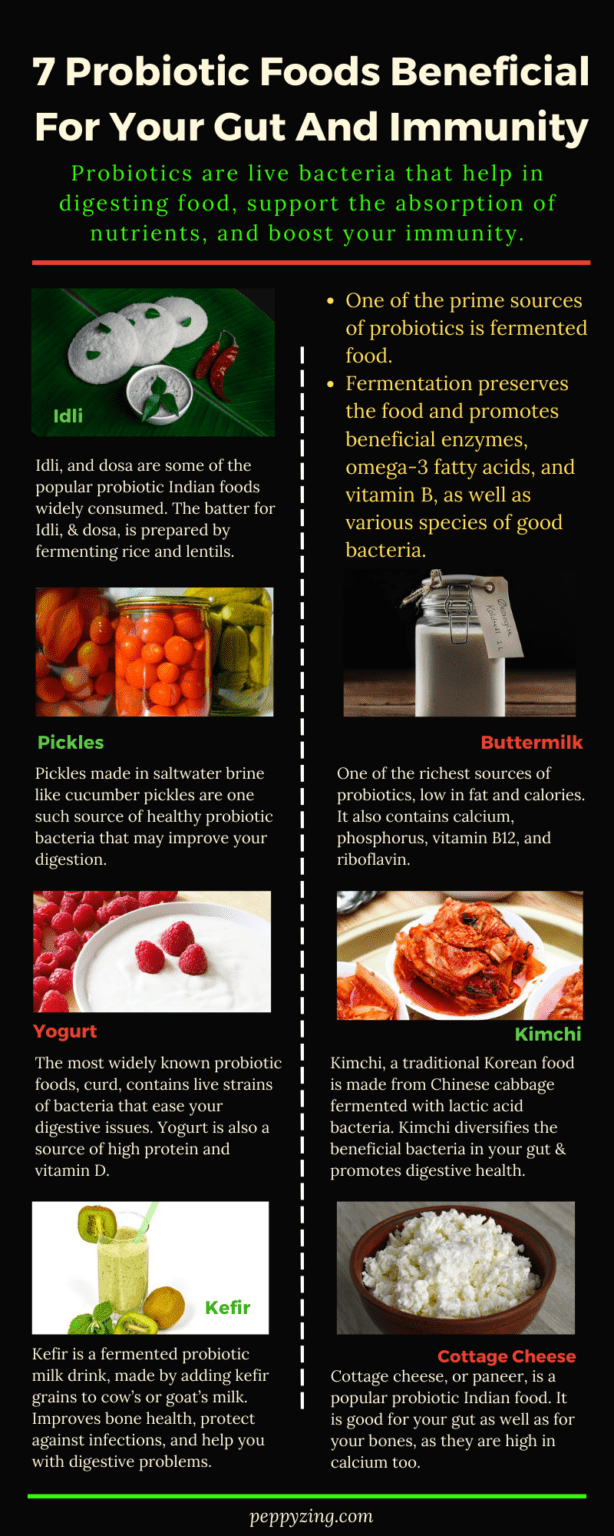
Suffering from digestive problems? Due to the hectic lifestyle and demanding work schedules, you often tend to neglect your health.
Not maintaining a proper lifestyle, untimely eating, aging, environmental toxins, irregular sleeping patterns will all contribute to poor health. Consequently, due to loss of microbial abundance, you end up suffering from various digestion-related issues including gastrointestinal disorders, diarrhea, and skin issues. When you come to think of a solution, the best probiotic foods like– yogurt, kefir, idli, buttermilk, cottage cheese and pickles are highly beneficial for your gut and immunity, can be of immense relief to your problems.
Table of Contents
What are Probiotic Foods
Probiotic foods are nothing but foods with healthy live microorganisms that are known to have health benefits when you consume them. Precisely speaking probiotics are live bacteria that help in digesting food, support the absorption of nutrients, and boost your immunity.
How do probiotic foods boost your health?
Research studies have shown that Probiotics are effective in fighting against various health challenges including allergies, arthritis, heart diseases, Gastrointestinal disorders, and can even help you in weight loss.
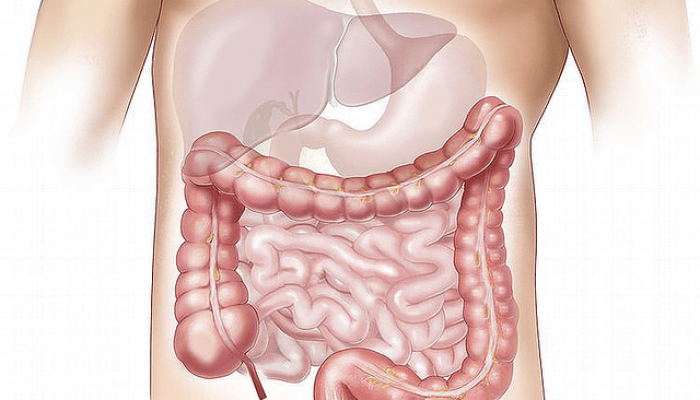
1. Healthy Gut and digestion
Did you know that your digestive tract is a home for more than 1000 kinds of bacteria? These bacteria help in breaking down the food you eat and absorb nutrients.
But, most of the food which you consume, contains elements that kill the good bacteria inside our body. Like, you must have observed, that when you are on antibiotics, you experience diarrhea, cramps, abdominal pain, bloating, and constipation.
This happens because the antibiotics kill both good and bad bacteria. Probiotics are often recommended as it will help you replace the bad bacteria with good bacteria and restore the balance in keeping your gut healthy.
Loss of probiotics can cause you various digestive disorders, frequent flu, and the common cold, skin ailments, and autoimmune diseases, as well.
In the long run, these disorders can prove harmful to your health. So, go ahead and eat probiotics for the proper digestion of food.
2. Immunity
Eating probiotic foods help in giving a boost to your immunity and inhibit the growth of harmful gut bacteria.
Also, some probiotics promote the production of natural antibodies in your body. So, if you are suffering from minor ailments like indigestion or a common cold, taking probiotics might be a good idea.

3. Weight management
While probiotic food can influence your gut health, not many studies have shown evidence that consuming it helps in weight loss.
Many scientists have a belief that your gut bacteria are important in determining body weight. But, so far there have been few randomized controlled trials that have assessed probiotics’ effects on body weight, total body fat levels, and body composition.
There is still not enough information available to confirm whether adding more probiotic food to your diet or taking probiotic supplements can help you lose weight.
However, there is evidence that boosting your fiber intake can help you lose weight. A fiber-rich diet does help you lose weight. High-fiber foods such as fruits and vegetables increase the diversity of the gut microbiome. The microbiome that protects you against germs and also breaks down food to release energy plays an important role in weight loss and other aspects of health.
4. Healthy Skin
If you are suffering from skin problems like acne, and eczema, probiotics can be helpful. Adolescents facing the problem of acne are correlated to gastrointestinal problems.
Several studies have indicated a relationship between intestinal bacteria and skin. So, keeping your gut happy, will eventually keep your skin also healthy.
In What Ways you can Get probiotic foods
Share this Image On Your Site
You might be wondering what all probiotic drinks and food options you have. Well, you need not run to your chemist store for it, as you can find it right in your kitchen and prepare it yourself from the ingredients available in your kitchen.
All you need to have some awareness about what types of food are probiotics and how does it help in boosting your digestion.
There are two ways to get good bacteria for your gut:
Through Fermented foods
Through Probiotic Supplements
Through Fermented foods
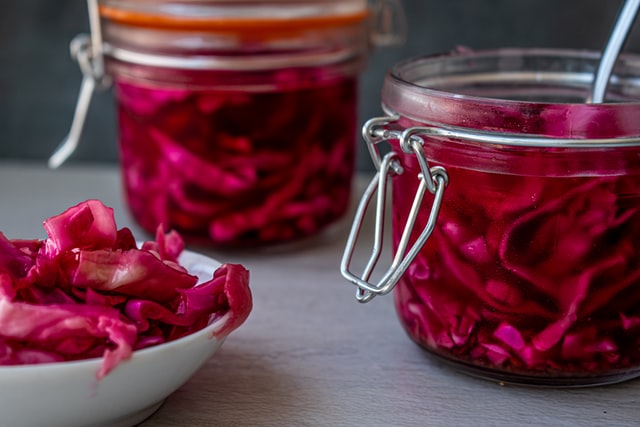
One of the prime sources of probiotics and the oldest technique of food preservation is a fermented food.
Foods that are fermented go through a process, in which natural bacteria feed on the sugar and starch in the food, forming lactic acid. Studies show that lactic acid helps in improving the nutritional value of food, controls intestinal infections and, improves digestion of lactose.
Fermentation preserves the food and promotes beneficial enzymes, omega-3 fatty acids, and vitamin B, as well as various species of good bacteria.
Basically, by fermenting the food you are transforming one type of food into another. For instance, you can convert milk into yogurt, cheese, and cream. Similarly, you can turn cabbage into sauerkraut, soybeans into miso, through the process of fermentation.
Fermented food is though healthy, the only downside to it, it can taste and smell strong, which may be unpleasant for you.
How many probiotic foods do you need to have
Well, there is no certain prescribed guideline as to how many fermented foods you should take and in what quantity. As long as you have a balanced diet, it’s likely that you’ll get the required probiotics from the food itself. Add such foods to your daily diet, as and when possible and, you are good to go.
What are the sources of Probiotic foods?
Here are some of the best probiotic foods.
1. Yogurt/Curd
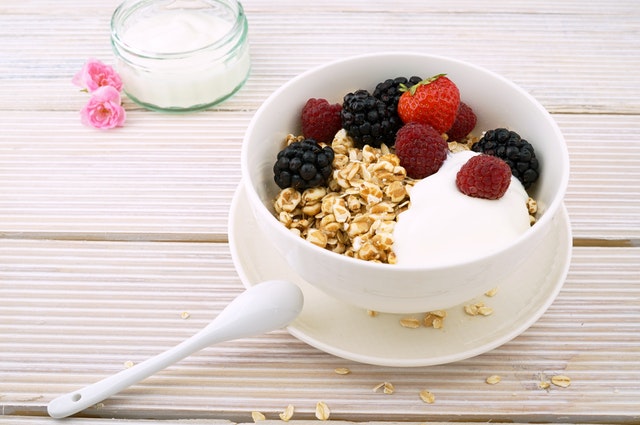
Yogurt, or curd, is one of the natural and most widely known probiotic foods that you can add to your daily diet. It contains live strains of bacteria that ease your digestive issues. Not only that, but it should also be a part of your daily diet because yogurt is a source of high protein and vitamin D.
Include a bowl of curd, in your diet daily to keep your gut healthy. Or you can top it up with green salads or fruits like strawberries and apples to make it even nutritious.
Try to have homemade curd but if you wish to get it from your grocery store, then be sure there is no added sugar to it.
2. Kefir
Kefir is a fermented probiotic milk drink. It is made by adding kefir grains to cow’s or goat’s milk.
Kefir is more or less like yogurt, as it’s also a cultured dairy product. Although both are dairy products, their flavor and texture differ. Where yogurt is thick and creamy, kefir is usually of liquid consistency. Due to the presence of yeast and the process of fermentation, Kefir will taste sourer than yogurt to you.
Moreover, Kefir contains more bacterial strains than yogurt and remains viable in your digestive system. Indeed, kefir has been linked to various health benefits. It may improve your bone health, protect against infections, and help you with digestive problems.
Kefir is one of the best sources of probiotics. If you are lactose intolerant, kefir can be an option. If you do not like its tangy taste, pair it with fresh fruit, or add it to a smoothie.
3. Idli and Dosa
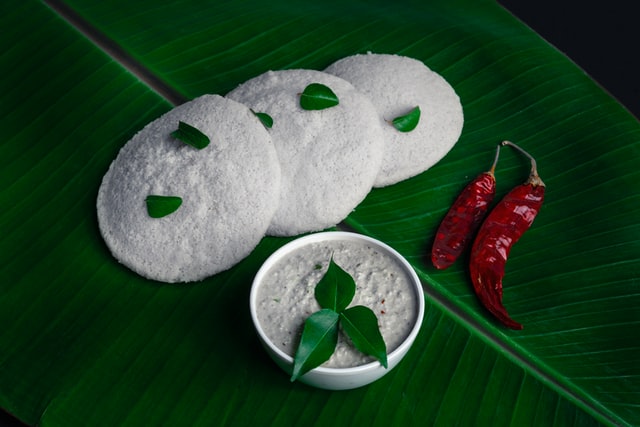
Is South Indian food your favorite? If so, then you have one more reason to relish it. Many of you might not be aware that Idli, and dosa are some of the popular probiotic Indian foods, widely consumed throughout the India. The batter for Idli, dosa, and other such food items are prepared by fermenting rice and lentils.
To prepare the batter you need to soak the rice and lentils overnight. Once the batter is prepared leave it for few hours to initiate the process of fermentation before cooking.
By undergoing fermentation, the bio-availability of its minerals increases, helping the body absorb more nutrition. So, include these delicious foods in your breakfast and give your day a healthy start.
4. Cottage Cheese (Paneer)
If you are a cheese lover, cottage cheese will be a good pick. Cottage cheese, or paneer, is also, another popular probiotic Indian food. It is good for your gut as well as for your bones, as they are high in calcium too.
Though most types of cheese are fermented, not all of them contain probiotics. So, choose cottage cheese to fulfill your need for probiotic food.
You can add raw cottage cheese to your salad with some salt and pepper to make it more delicious.
5. Buttermilk
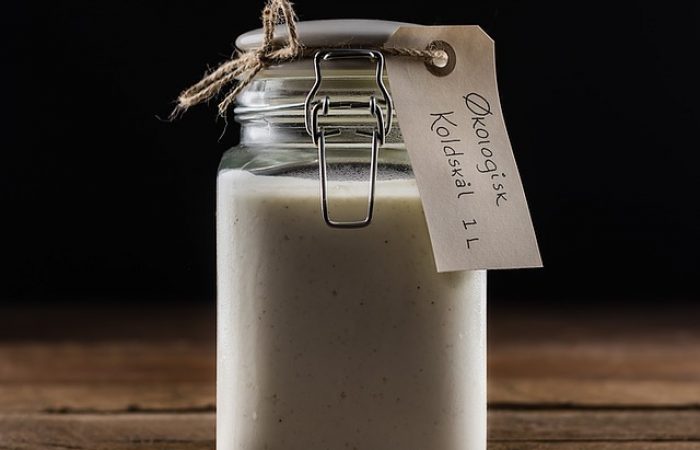
Buttermilk is yet another one of the richest sources of probiotics. It is also a good source of calcium if you are lactose intolerant.
If you are not fond of eating curd, you can opt for buttermilk as an alternative to it. Buttermilk is nothing but a leftover liquid after churning the curd into butter.
Buttermilk is not only low in fat and calories but also contains several important vitamins and minerals, such as calcium, phosphorus, vitamin B12, and riboflavin.
Buttermilk is known for years to help in treating diarrhea, though it has not been scientifically proven. Yet it will impart some benefit by keeping you hydrated if you take it during diarrhea.
Please do consider before buying it from stores, as only traditional buttermilk contains probiotic and not the cultured ones, commonly found in supermarkets.
6. Pickles
Isn’t it surprising to know that pickles can also be probiotic food? Yes, cucumber pickles are one such source of healthy probiotic bacteria that may improve your digestion.
To make cucumbers probiotic, you need to pickle them in salt and water solution. Leave it to ferment it for some time in their own naturally present lactic acid bacteria.
Pickled cucumbers are rich in vitamin K that helps in blood clotting but, they also tend to be high in sodium. So, enjoy the sour pickle to keep your gut healthy but remember to eat it in moderation.
Remember, that not all pickles are probiotic. Pickles made with vinegar brine, stop the growth of bacteria. Only pickles made in saltwater brine are probiotics because they do not inhibit the bacterial growth.
7. Kimchi
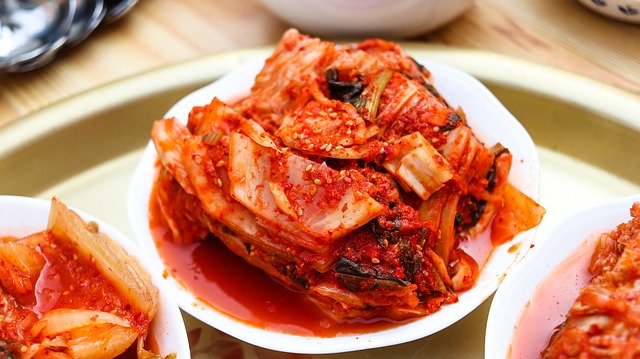
Kimchi is a unique and traditional Korean food made from Chinese cabbage fermented with lactic acid bacteria. Kimchi not only tastes good, but it diversifies the beneficial bacteria in your gut and promotes digestive health. This is why it is an excellent source of probiotics.
Kimchi is made from cabbage, radishes, and scallions, cabbage usually being the main ingredient in it. You can flavor it with a mix of seasonings, ginger, red chili powder, other spices, herbs, and salt to make it taste even more impressive.
Probiotics through supplements
You can also obtain probiotics by taking supplements along with your diet. Usually, a balanced diet consisting of probiotic food is sufficient for you to keep your gut and immune system healthy. However, if you are looking to boost your health by probiotic supplements, make sure you take the correct supplement to get the desired result.
Consult your doctor or dietician, before starting any such supplement to improve your digestive health.
Krishna is a Management graduate in Human Resource. She is an avid reader, knowledge seeker, and an adoring mother of two lovely kids.
